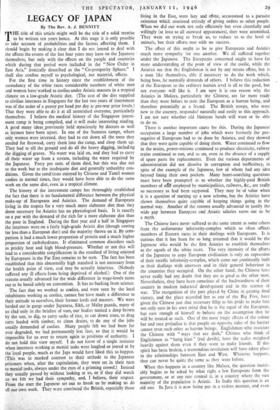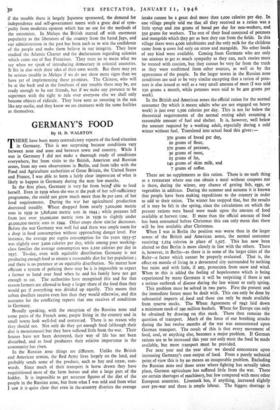LEGACY OF JAPAN
By The Rev. A. J. BENNITT
THE title of this article might well be the title of a solid treatise I to be written ten years hence. At this stage it is only possible to take account of probabilities and the factors affecting them. I should begin by making it clear that I do not intend to deal with the effects the events of the last four years may have on the Japanese themselves, but only with the effects on the people and countries which during that period were included in the "New Order in East Asia," ironically described as the "Co-prosperity Sphere." I shall also confine myself to psychological, not material, effects.
For. the first time in history since the establishment of the ascendancy of the white races considerable numbers of white men and women have worked as coolies under Asiatic masters in a tropical climate on a low-grade Asiatic diet. (The cost of the diet supplied to civilian internees in Singapore for the last two years of internment was of the order of a penny per head per day at pre-war price levels.) That they were able to do it at all astonished everyone, particularly themselves. I believe the medical history of the Singapore intern- ment camp is being compiled, and it will make interesting reading. A good many ideas.previously held tenaciously by doctors as well as laymen have been upset. In one of the Sumatra camps, where only women were interned, they had to cut down all the trees they needed for firewood, carry them into the camp, and chop them up. They had to till the ground and do all the heavy digging, includ:ng the digging of graves. No water was laid on, and they had to carry all their water up from a stream, including the water required by the Japanese. Forty per cent, of them died, but this was due not to the work but to the inadequate diet and generally unhealthy con- ditions. Given the conditions enjoyed by Chinese and Tamil women coolies in normal times, they would have been able to do the same work on the same diet, even in a tropical climate.
The history of the internment camps has thoroughly established
the fact that there is no fundamental difference between the physical make-up--of Europeans and Asiatics. The demand of Europeans living in -the tropics for a very much more elaborate diet than they deem necessary for Asiatics has no physiological basis. It is exactly on a par with the demand of the rich for a more elaborate diet than the poor in England. During the first year and a half in Singapore the internees were on a fairly high-grade Asiatic diet (though costing tar less than a European diet) and the majority throve on it. By com- parison it had a much lower proportion of protein and a much higher proportion of carbohydrates. It eliminated common disorders such as prickly heat and high blood-pressure. Whether or not this will lead to a considerable simplification in the standard of living enjoyed by Europeans in the Far East remains to be seen. The fact has been established that this abnormally high standard is not necessary from the health point of view, and may be actually injurious. (Nobody suffered any ill effects from being deprived of alcohol.) One of the reasons usually advanced for the wide difference in wage-levels turns out to be based solely on convention. It has no backing from science.
The fact that we worked as coolies, and were seen by the local
inhabitants working as coolies, cannot but have made a difference to their attitude to ourselves, their former lords and masters. We were herded out in gangs under Japanese, Sikh, or Malay guards, many of us clad only in the briefest of vees, our bodies tanned a deep brown by the sun, to dig, to carry sacks of rice, to cut down trees, to drag carts loaded with timber, to clean drains, to do any of the jobs usually demanded of coolies. Many people felt we had been for ever degraded, we had permanently lost face, so that it would be impossible for us ever to return again to positions of authority. I do not hold this view myself. I do not know of a single instance when internees working at menial tasks were laughed or jeered at by the local people, much as the Japs would have liked this to happen. (This was in marked contrast to their attitude to the Japanese prisoners when, after the capitulation, they were set in their turn to menial tasks, always under the eyes of a grinning crowd.) Instead they usually passed by without looking at us, -or if they did watch us we felt we- had their sympathy, and, I believe, their respect. From the start the Japanese set out to break us by making us do all our own work. They were convinced the British, especially those
living in the East, were lazy and effete, accustomed to a parasite existence which consisted entirely of giving orders to other people. When we did our work not only efficiently but even cheerfully and willingly (at least to all outward appearances), they were astonished. They went on trying to break us, to reduce us to the level of . animals, but their efforts met with no success.
The effect of this ought to be to give Europeans and Asiatics • much more sympathy for one another. We all suffered together under the Japanese. The Europeans concerned ought to have far more understanding of the point of view of the coolie, while the Asiatics see that the. Englishman is not by any means effete, but is a man like themselves, able if necessary to do the work which, being boss, he normally demands of others. I believe this reduction of the European to the ordinary human level is all to the good, but not everyone will like it. I am sure it is one reason why the Asiatics in Malaya, particularly the Chinese, are far more ready than they were before to treat the European as a human being, and therefore potentially as a friend. The British troops, who were new to the country, responded naturally and easily to this approach. I am not sure whether old Malayan hands will want or be able to do so.
There is another important cause for this. During the Japanese occupation a large number of jobs which were formerly the pre- rogative of Europeans had to be done by Asiatics, and they showed that they were quite capable of doing them. Water continued to flow in the mains, power-stations continued to produce electricity, railway trains continued to run, and so on, even in the absence of a supply of spare parts for replacements. Even the various departments of administration did not dissolve in corruption and ineffici4ncy, in spite of the example of the Japanese, few of whom had any idea beyond lining their own pockets. Many heart-searching questions must have been prompted as to whether the highly-paid British members of stlff employed by municipalities, railways, &c., are really so necessary as had been supposed. They may be of value when it is a question of starting up a new scheme, but the Asiatics have shown themselves quite capable of keeping things going in the normal way. Another of the reasons usually advanced to justify the wide gap between European and Asiatic salaries turns out to be a myth.
The Chinese have never suffered to the same extent as some others from the unfortunate inferiority-complex which so often afflicts members of Eastern races in their dealings with Europeans. It is curious that it has been for so long assumed that it would be the Japanese who would be the first Asiatics to establish themselves as the equals of the white races. The very intensity of the efforts of the Japanese to copy European civilisation is only an expression of their terrific inferiority-complex, which came out continually both in their dealings with internees and in tlieir general behaviour in the countries they occupied. On the other hand, the Chinese have never really had any doubt that they are as good as the other man. Nevertheless, they have been conscious of the backwardness of their country in modern industrial devehpment and in the science of war. The recognition of the part played by China in .gaining final victory, and the place accorded her as one of the Big Five, have given the Chinese just that necessary fillip to his pride to make him not only sure in his own mind that he is the equal of the European, but sure enough of himself to behave on the assumption that he will be treated as such. One of the most tragic effects of the colour bar and race prejudice is that people on opposite sides of the barrier cannot treat each other as human beings. Englishmen who associate the Chinese with "ways that are dark," Chinese who think of Englishmen as "hung kuai " (red devils), have the scales weighted heavily against them even if they want to make friends. If this spirit has been broken, a tremendous revolution will have taken place in the relationships between East and West. Whatever happens, they can never be quite the same as they were before.
When this happens in a country like Malaya, the question inevit- ably begins to be asked by what right a few Europeans form the government, or at any rate control it, in a country where the vast majority of the population is Asiatic. In India this question is an old one. In Java it is now being put in a violent manner, and even if the trouble there is largely Japanese sponsored, the demand for independence and self-government meets with a great deal of sym- - pathy from moderate opinion which has no use for the methods of the extremists. In Malaya the British started off with enormous popularity as the liberators of the country from the hated Japs, and our administration in the past has been such as to win the confidence of the people and make them believe in our integrity. They have studied the Atlantic Charter and the declarations regarding colonies which came out of San Francisco. They trust us to mean what we say when we speak of introducing democracy in colonial countries. It fits in also with their idea of their own worth. But there may yet be serious trouble in Malaya if we do not show more signs than we have yet of implementing these promises. The Chinese, who will be at the back and in the forefront of any trouble there may be, are ready enough to be our friends, but if we make any pretence to be supermen with the right to rule over everyone else we shall only become objects of ridicule. They have seen us sweating in the sun like any coolie, and they know we are creatures with the same frailties as themselves.































 Previous page
Previous page